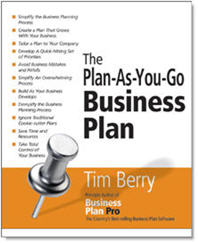They seem like opposites. Zen’s about mindful acceptance of the present moment. Planning is about managing the future. Seems like Zen business planning is oxymoronic. I hope not.
Why do you care? Maybe because real business planning aligns your business with your self and the world around you. Maybe as a response to business plan bashing, which happens when people confuse the plan (ugh, big document, hard, formal, not necessary) with planning (focus, prioritizing, envisioning the future, setting directions, dealing with change, managing).
Why do I care? I respect Zen. Maybe it’s the coolness factor, as I posted recently, Zen and the Art of Copying. Guy Kawasaki has a good post called the Zen of Business Planning. Maybe it’s Gil Fronsdal, and his zencast.org podcasts, to which I listen frequently.
Maybe it’s my new book, The Plan-As-You-Go Business Plan,  which deals with (among other things) some Zen-like contradictions and paradox in real business planning. Your business plan is always wrong, but vital. A good business plan is never done. Consistency is critical except when it isn’t. Plan for change. Do what you use, do what you need, no more. The plan is what you want to happen, not the document, not the presentation. And so forth.
which deals with (among other things) some Zen-like contradictions and paradox in real business planning. Your business plan is always wrong, but vital. A good business plan is never done. Consistency is critical except when it isn’t. Plan for change. Do what you use, do what you need, no more. The plan is what you want to happen, not the document, not the presentation. And so forth.
So, reflecting on Zen and Business Planning, I suggest four key points:
- Accept change as constant. The value of the plan isn’t mindless implementation in a guessed-at future. The value of the plan is the planning process, the management of change it creates. Planning enhances vision and understanding of past, present, and future.
- Use planning to remain mindful of which direction you want to move. Towards which horizon. Stay mindful of your own definition of success.
- Understand how, as you move through business time, where you are is always different from where you thought you’d be (via lucica at dress head). You do that by leaving tracks (the plan) which you can use to trace changed assumptions (plan vs. actual).
- Correct your course as your assumptions change, remaining mindful of long-term direction and short-term necessity.




Comments
When you write a business plan you have to consider what is working at the moment and we have to remember that we can adjust our business plan any time. At the end of the day is about the business goals. Thank Tim for sharing.
[…] to like, tried to like, but couldn’t. Yes, I gave into the horrible temptation, and even posted Zen and Business Planning here. I’m sorry. It was a moment of […]
I’ve practiced Zen for 20 years, and won 2 business plan competitions.
Yes, Zen focuses on the present, but in Buddhism the present is understood to contain all of the past and all of the future.
Another key point: No matter how thorough your plan, your plan is a model of reality. It is not reality itself. Don’t be too much in your head and miss true reality.
Thanks Doug, that’s a great addition. Tim
Great article and blog…just stumbled across it.
I felt the same contradiction that you had when I try to link Zen and BP. Zen is the present, Business Planning is about the future. How can I overcome that contradiction? I think that “Accept change as constant” and “remain mindful” are arrows to the right direction.
I found this post while searching for Gil Fronsdal. As a small business owner who has struggled with conventional business plans over the past two years, I think you book looks like a great solution.